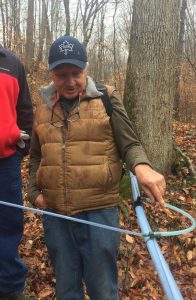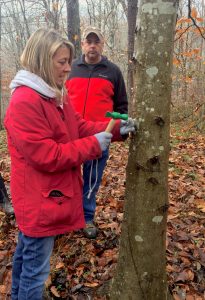By Karen Milnes

Mike Rechlin, professor at Future Generations University, gives a tubing demonstration.
Everybody knows about Vermont maple syrup, and it’s time to put West Virginia on the map. With an estimated 0.04% (USDA—NASS) of the state’s tappable maples in production, there’s a lot of room for growth. And if this industry is doing anything, it is growing. And fast. According to a survey conducted by the Appalachian program at Future Generations, the number one component in helping our state’s maple industry expand is the need for more sap from more taps.
With ongoing innovations in the sap to syrup process, a growing number of West Virginia producers are capable of processing a lot more sap than they can obtain. Backyard syrup making is not only a mountain tradition in these parts, it’s a growing hobby as the farm and food movement sweeps across our nation. The Sweet Opportunites: Tapping West Virginia’s Maple Resource project at Future Generations University aims to start networking sap collectors and syrup producers, setting up a “hub” model, already popular in more established maple syrup producing states. What’s nice about this model is that it allows, for fairly minimal overhead, just about any landowner with maples on their property and a maple syrup producer nearby, to break into the industry with little risk. Oftentimes, sap collectors simply selling their raw sap are able to pay off the collection equipment in the first year. In a relatively short time, they can begin scaling up their operations and considering purchasing larger equipment to begin producing their own syrup.
One of the most exciting parts of this industry in West Virginia, is that the demands for local syrup are not even close to being met. This really sets the stage for a cooperative environment versus a highly competitive one. The West Virginia Maple Syrup Producers Association has already cultivated a highly supportive setting, and the Sweet Opportunity project staff aims to enhance this as much as possible. We will be working closely with not only the WVMSPA, but government and business coaching agencies to provide as many resources as possible to our producers and satellite collectors. There will be on-site technical demonstrations, and eventually, a Producer’s Handbook for West Virginia.

Dayna and Mark Lambert practicing proper tapping techniques.
Equally as exciting is the fact that proper management of a sugar bush is inherently an environmentally sustainable practice. Cultivating your forest for maple production is not only beneficial to the trees, but to a myriad of native species that inhabit the forest. It seems to be a win-win for all involved. What a Sweet Opportunity!
The initial focus of this project will be on existing maple producers in any of these eleven counties: Wayne, Lincoln, Summers, Greenbrier, Nicholas, Webster, Pocahontas, Randolph, Pendleton, Grant and Hardy. If you are a maple syrup producer or own a wooded lot, feel free to contact us to see if this program can benefit you. Also check out our Maple Sap Collection and Syrup Processing certification course, which includes field, online, and mentorship components and a membership into the WVMSPA!
The Sweet Opportunities project is supported through the generosity of the Claude Worthington Benedum Foundation. This project advances the Benedum Foundation’s strategic priority of economic development based on natural assets.



2 thoughts on “Sweet Opportunities for West Virginia”
New to WV and Maple Syrup (wanting to start) Would enjoy going to a class and learning more. Please send me more information. Thanks
Hi Chuck! Welcome to the neighborhood! We love your enthusiasm and will be in touch with more information soon.
Comments are closed.